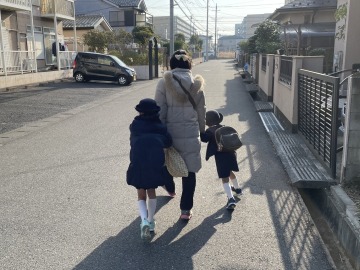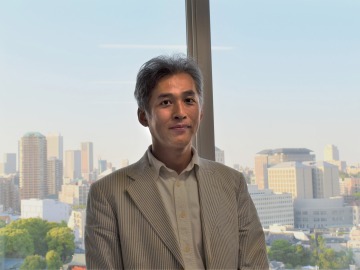Child-Rearing : When the “Unexpected” is “Normal”
Mitsunori Ishida
Professor Faculty of Letters,
Arts and Sciences
Waseda University

▲ Sending off my daughter for the last time to preschool
My first child is nine years old and my second is seven, so their preschool “childcare years” are over. I’ve lived for 51 years, which means I’ve experienced much more than just child-rearing. Nonetheless, my memories of raising my children during their early years are still fresh. So many surprising and transformative experiences occurred that I could write a book about them! In this short essay, I present some reflections on my research and consider my work from the perspective of raising children.
My research on child-rearing has primarily involved questionnaire-based surveys of the general society. What has been most striking is the gap between the images of child-rearing depicted in survey results and the real–life experiences shared by parents. For example, I conducted a questionnaire survey combined with interviews with mothers in Matsudo City, Chiba Prefecture. The results were profoundly interesting, so I would like to briefly introduce them here.
The questionnaire survey asked mothers about the happiness they felt and the frequency with which they thought about how good it was to have a child. The results showed that 50% of the mothers felt “Extremely happy,” 48.6% felt “Somewhat happy,” 1.4% felt “Not so happy,” and 0% selected “Not at all happy.” The frequency of felling glad to have had a child was 95.9% for “often”, 4.1% for “sometimes,” and 0% for “very rarely” and “never”. In other words, almost all mothers (98.6%) reported feeling happy, and 95.9% reported reflecting several times on the positive experience of having a child.

▲ Wrote and published book
Throughout my research career, I have looked at various social surveys, but I have never seen results such as these, where so many mothers were happy and shared positive opinions. Furthermore, I obtained similar results in a survey conducted among all mothers who had experienced childbirth in 2020 and lived in a district of Matsudo City with a high birth rate.
This means that sample bias did not influence the survey results. Looking at these findings, I was newly impressed by the positive impact that the joys of childbirth had on mothers.
However, when I conducted interviews with the survey respondents, the image of happiness presented by the statistics changed completely. The mothers spoke not of the happiness they derived from raising their children but rather of their actual experiences, describing their day-to-day efforts as “walking a tightrope.” They could not plan for a “typical day” in any way, as they had to respond to real-time changes virtually every few minutes. Moreover, the realities they constantly experienced were ones they had never encountered before. They spend their days, weeks, months confused and practically “out of their heads.” They sighed as they recounted their real situations.
Indeed, I was the same. Every day, I felt like I was “on the edge,” ready to scream! For example, it took two people to bathe the infant, one waiting in the bath while the other placed the baby into their hands. When one begins to raise a child, one becomes aware of these and other simple truths. But if I had been asked the survey question, “Are you happy right now?” I would surely have answered, “Yes, I’m happy!” This is the core truth of childrearing that we sometimes lose sight of.

▲ Author
So many people living in Japan have experienced childbirth and rearing. In that case, it is a “normal” thing. We still have a lovely, bright image of the happiness that comes with childbirth, and there is certainly nothing wrong with that. We want everyone who has and raises children to experience joy. However, this “normalcy” is often filled with the “unexpected” time and again in the daily lives of families with small children. In other words, the early years with a child are an intermixture of the normal with the unexpected.
Now, if we focus on the “normal,” then we end up criticizing ourselves for being unable to raise a child “normally,” that is, according to what we imagine to be the “norm.” This focus also forces us to suppress and hide our complaints and dissatisfactions, as, after all, this whole thing is just part of our experience of “normal” life. People around us also seem to view our situations as parents from a strict perspective, assuming that raising a child is simply “normal.”
So, rather than getting caught up in all that, we need to turn our thoughts to the “unexpected” aspects of what we are encountering. We must realize that, as parents with young children, we will be faced with “unexpected” situations, and this perspective will help us reach out to others and rely more on others for a helping hand. If the people around us can share this view, the environment for raising children would certainly be much easier and better.
■ Profile ■



